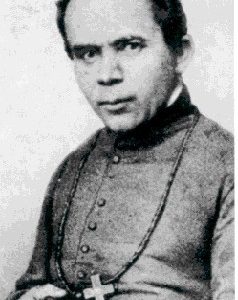Many Catholics think that Protestants are “ahead of the curve” on innovative evangelization. In some ways there’s much to learn from Protestants, but some things just don’t fit. One area that Catholics have recently picked up language and habits is in the idea of “spiritual multiplication,” which is often described as the definition of “discipleship.” I think in this area we err when we give too much weight to a word and method that might not be as at-the-heart-of-being-Christian as we think. And, we miss out on the power of being who we are as the Body of Christ.
The word disciple is a good word, and I’m not picking fights with the basic idea. The word has been especially popularized in recent times because of the witness of the Lutheran Pastor Dietrich Bonhoeffer who wrote passionately about the cost of following Jesus in his book The Cost of Discipleship. That cost for Bonhoeffer was his life, as he was killed in captivity by the Nazis. Discipleship is the reality that we as Christians do not follow ideals or principles, but we ultimately follow the Person of Jesus Christ, and that means we carry a cross. The cross is the best measurement of authentic discipleship – if it’s there you are a disciple; if it’s not you’re not. Bonhoeffer’s discipleship is an emphasis on the radical call that Jesus gives us, and how much it means – and costs – for us to really follow Him and His Ways, Truth, and Life. In this sense, the word discipleship highlights the personal and real relationship that the believer has with his God.
In common usage today, especially in groups zealous to each the world with the Gospel, discipleship also refers to the fact of us making disciples of others, coming to be seen as a sort of “means” of evangelizing. I mentioned it being called “spiritual multiplication”. Matthew Kelly, a popular speaker right now in the Catholic world, describes it this way in The Biggest Lie in the History of Christianity:
What is Spiritual Multiplication?… It is based on one very simple idea: Invest in a small group of people, teach them how to…become disciples of Jesus, them empower each of them to go out and do the same for another small group of people.
Kelly refers to a sort of mathematical reality, that if each Christian took his call to evangelize seriously, and he focused energy on, say, “discipling” 3 people, the impact is exponential – 3 people disciplining 3 people discipling 3 people, for example, would be the “reaching” of 27 people. Going just two more “generations” of this, we reach 243 people! It multiplies endlessly, like kittens on my farm. Groups like FOCUS have especially latched on to this, and I took a class with Curtis Martin, the founder of FOCUS who has made this a sort of life mission – to show how impactful Christians are when they act as disciples, and listen to Jesus’ words: “Go make disciples of all nations…” Mathematically, Curtis said, one believer practicing spiritual multiplication can reach more people than even a Pope like St. John Paul II who spoke to millions.
No one could say this is objectively bad, but I think the overemphasis on “discipleship” may, at worst, reduce Christianity to a pyramid scheme for truth. At best, however, it may gloss over the more core identity of the Christian, which is familial, and fail to answer the most pressing issue of modernity, which is the rise of the autonomous individual, the man dislodged from belonging, meaning, and purpose. The familial relationship of Christians is now more needed than ever, because its more absent than ever.
The great crisis we face right now is not just the loss of numbers on the Church roles, but we have lost the sense of fraternal bondedness that is at the heart of believing in Christ. The effect of the chaos on the Church following Vatican II is not just from confused people leaving, but the breakdown of the things that were the signs and symbols of our bonds – shared and stable belief and liturgy, for example. In other words, it’s not just that we’re losing people, but that we aren’t a people.
Let’s just say it in case you really like the word discipleship: as believers we are all disciples and are called to make disciples. Scripture is clear. However, the word “disciple” falls out of use in the New Testament after the book of Acts (my searches seem to say Acts 21:16 is the last place it is used), and it is rarely used in the early Church or renewal movements throughout the Church’s history (like religious orders). This makes sense, because the theological reality of salvation and membership in the Body is deeper than the word disciple can really go. The word was used in Jesus’ day to describe the followers of a particular teacher. So, for example, we hear of John and Jesus’ disciples understanding themselves as united in the truth but distinguished by the physical following of someone speaking that truth: “Then the disciples of John came to him, saying, ‘Why do we and the Pharisees fast often, but your [Jesus’] disciples do not fast?’” (Matthew 9:14).
After the book of Acts, which largely described the work of those that were direct disciples of Jesus in the sense of physically following Him, the words used to describe believers reflects what salvation itself is, an initiation into the family of God. Believers are called sons and brothers, and spiritual oversight is referred to in a fatherly sense. To be saved is to become an adopted son of God (Eph 1:5). To live as a Christian is to, firstly, love your fellow Christians as a brother (for just a taste, see Hebrews 13:1, Rom. 12:10, 1 Pet. 1:22, and especially the Epistles of St. John). And to bring people into the fold is to act as a father (1 Cor 4:14, 1 Thess. 2:11, 1 John 2:1). Yes, to follow Christ is to be a disciple, but it is so much more and our relations to one another also shape our self-understanding. So, scripturally speaking, the dynamic of the disciple matured into the fact of family. This worked. There is no clear description of the sense of “spiritual multiplication” in scripture, but constant calls to love fraternally, and from the overflow of that fraternal bond comes the power to evangelize and bring people in. Within the body are different charisms, given by the spirit, and not all are called to go out as missionaries, but all are called to “love the brotherhood” (1 Peter 2:17).
The word disciple emphasizes, somewhat by analogy, that we follow the ultimate Teacher and teach others his ways. The words son, brother, and father, however, are not analogies but the truth of who we are as the People of God. We, the Church, are a family. Our relationships are in the deepest and trust sense filial, fraternal, and paternal, which is more profound than the teacher/student relationship connotated in the word disciple. It does seem that the touting of “discipleship” has the air of strategy that does not always touch on the first need we have, which is to belong to the family. “Becoming a disciple of Jesus,” says the Catechism, “means accepting the invitation to belong to God’s family, to live in conformity with His way of life…” (CCC 2233). Religious call each other by “bother” and “sister” to emphasize their Christian walk. No religious order calls each other by “disciple”.
We American men especially use and like the language of strategy and business, which is probably why Matthew Kelly (a motivational business speaker) latches on to “spiritual multiplication” and it is so well received. But in the life of Christ, fishes and loaves are multiplied, persons saved from sin are born, befriended, and adopted by and in Christ. It might seem like semantics, but language and sense matters. It is much easier, say, to implement a program of spiritual multiplication than to hold possessions in common (Acts 2:45), confess sins to each other (James 5:16), or to sell real estate to help the poor in your parish (Acts 4:32).
The reason I think the emphasis on our familial bonds to one another is so important in our day, is that loneliness and isolation – even spiritual isolation – is the plague of modernism. Relativism, the sexual revolution, and even the blatant heresies we face today, are issues of individuality triumphing over the good of the whole, the body. Our loneliness has turned deadly, spiritually, communally, and even physically by suicide and drug and alcohol addiction. Enthusiastic discipleship programs will not solve this problem. They help. They are good. But we need a renewal of trust and tradition (which binds people together) to get at the heart of our problem. In short, I don’t think kindling zeal-proper-to-a-disciple gets to the heart of the problem. The fact is we’re all unwilling to submit to the vulnerability and sacrifice that it takes to love one another as Christ has loved us, which we must do before we tell the world about Him.
And the emphasis on brotherliness is important because it works. The early Church exploded not because of spiritual multiplication, but because the early Church emphasized profound conversion, initiation, and belonging. It was the spiritual and corporal works of mercy that changed the world, not just the doctrines of Christ and their efficient dissemination. New converts weren’t even allowed to attend the Eucharist before Baptism and Confirmation! (Not a “welcoming” approach to liturgy, huh?). They kept their faith a secret, but it was most often revealed in the intensity of their unity and fraternity. Their unity went so far as to relinquish property and hold things in common. Tertullian, a Church Father, reports that the Romans, who were focused on wealth, power, and pleasure above all, were particularly moved by the Christians and would exclaim, “See how they love one another!” Apparently, this was a challenge to the self-focus of that day. Is selfishness not worse today?
Yes, we must make disciples of all nations. But our utter inability to live in common, to live a shared culture of faith, is our greatest challenge to evangelization, not our unwillingness to meet with a non-believer for lunch and share the Gospel. If there is no body to be initiated into as a Christian – no place of obvious love and care – then our missionary zeal is thwarted before we set out to make disciples. This is why Joseph Ratzinger said, “We can … be certain that the Church will gain in missionary power as she begins to make her own internal brotherliness more vital.” Discipleship groups, I think, are successful because of the group’s bond, not just the discipleship. FOCUS, for example, preaches an intense life of “discipling” through its missionaries, but it is likely the shared culture and connection that brings the power to the efforts, not the effort alone. We aren’t weak bodies of believers because we’re not discipling people. We’re not discipling people because we’re weak bodies of believers.
In a world of such isolation, I’m not sure beating the pulpit and saying “be a disciple” speaks to the heart of our longing. Neither does “save your soul”, for that matter, which is a phrase that does not appear in scripture (not that it’s a bad phrase). How do we know, after all, that we are no longer spiritually dead and are indeed alive? “We know that we have passed from death to life,” said St. John, “because we love one another. Whoever does not love abides in death” (1 John 3:14).
In other words, we cannot grow in outward facing zeal if we do not first have inward facing love. We are a family, not an enterprise. Our renewal does not begin in programs for outreach, or even inviting friends to Mass. It begins in our love and communion with one another, with a shared culture and tradition that is binding and true. Yes, we are disciples of Christ. He told us to make disciples. He also called us friends and was even so humble as to “not [be] ashamed to call us brothers” (Heb. 2:11). That is the first sign of true discipleship, which is why I think we need to start talking more about the binding of brotherliness and family ties. “By this everyone will know that you are my disciples,” said Jesus, “if you have love for one another” (John 13:35).
For more on the topic of brotherliness and initiation, especially for men, see Leaving Boyhood Behind: Reclaiming Catholic Brotherhood by Jason Craig.
The post What “Discipleship” Models Get Wrong About Christianity appeared first on Those Catholic Men.
This article is reprinted with permission from our friends at Those Catholic Men.












